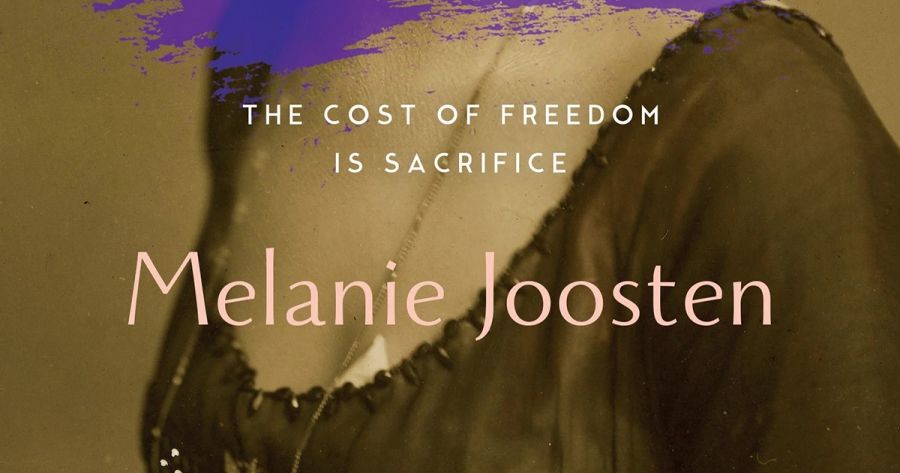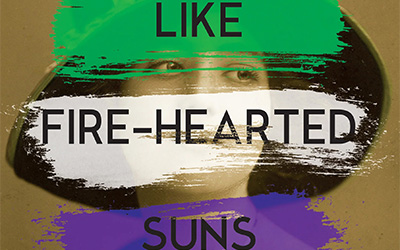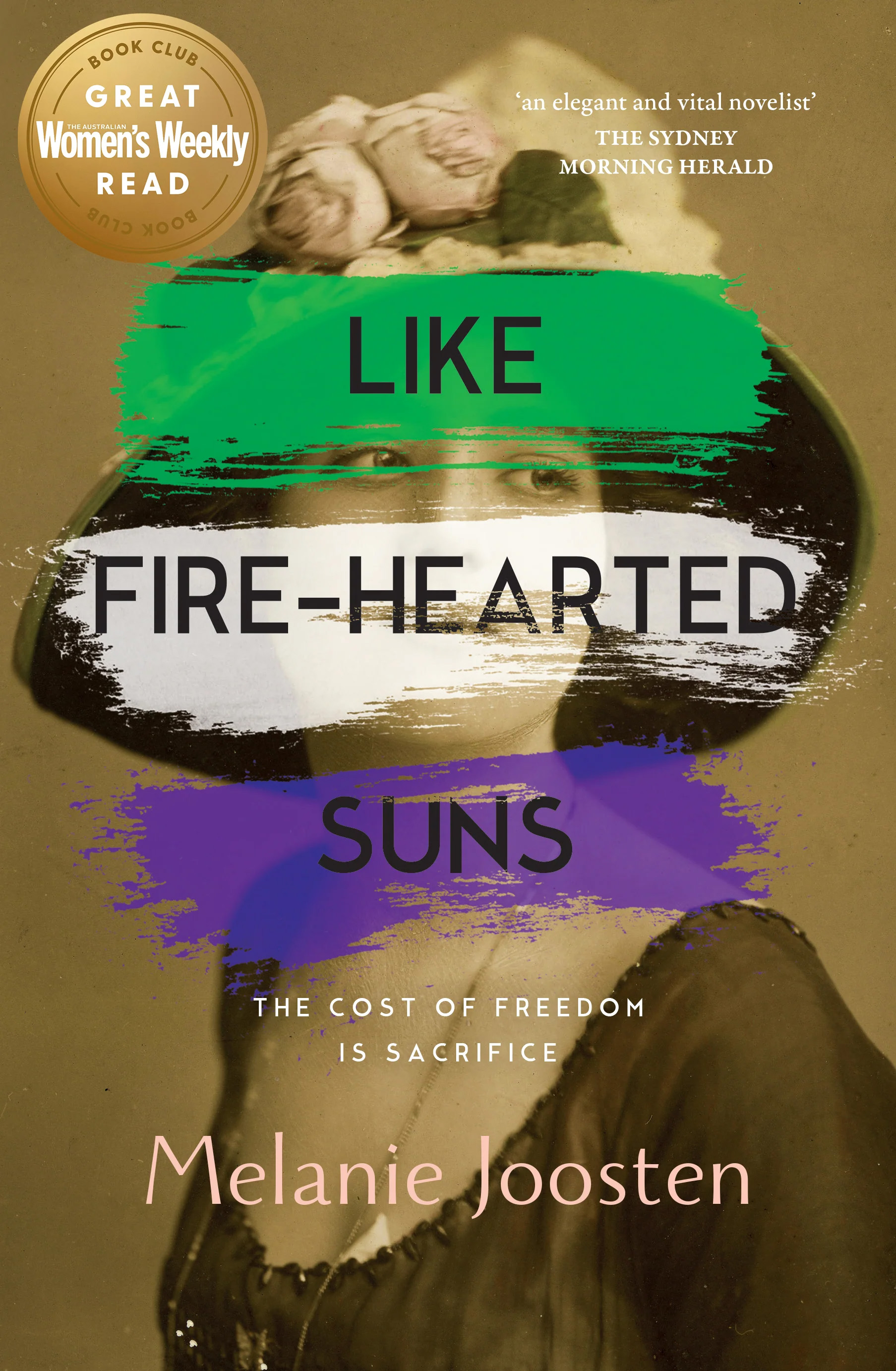
- Free Article: No
- Contents Category: Fiction
- Review Article: Yes
- Article Title: The dismissal of self
- Article Subtitle: Ticking the boxes of historical fiction
- Online Only: No
- Custom Highlight Text:
Melanie Joosten’s third novel follows three women who are brought into contact during the fight for British women’s suffrage. Beatrice Taylor, captivated by the movement, becomes a full-blown militant. Her college roommate Catherine Dawson stays out of the direct struggle, preferring to advance women’s rights through a trail-blazing career in scientific research. Ida Bennett, a widow, supports herself and her children as a warden in Holloway Prison. Although sympathetic to the cause of women’s emancipation, when the suffragettes are jailed she is responsible for disciplining them.
- Featured Image (400px * 250px):

- Alt Tag (Featured Image): Amy Walters reviews ‘Like Fire-Hearted Suns’ by Melanie Joosten
- Book 1 Title: Like Fire-Hearted Suns
- Book 1 Biblio: Ultimo Press $34.99 pb, 408 pp
- Book 1 Cover Small (400 x 600):

- Book 1 Cover (800 x 1200):

The novel’s preoccupation with suffering and its questionable rewards is set by its evocative title, which derives from George Eliot’s poem ‘The Spanish Gypsy’: ‘For strong souls / Live like fire-hearted suns to spend their strength / In farthest striving action; breathe more free / In mighty anguish than in trivial ease.’ Although not used as an epigraph, this quote is an apt characterisation of the protagonists’ plights. While all three women rebel against gendered expectations in different ways, and while suffrage is an all-consuming concern only for Beatrice, the bulk of the novel is haunted by the question of what will follow when women have been granted the franchise. The members of the Women’s Social and Political Union express ‘cautious optimism’ that ‘the world would open’ with ‘[e]qual pay for equal work’. Meanwhile, other women with a more sophisticated grasp of their own subjugation understand that the vote will not be the magic bullet they had hoped for.
The question, however, is undoubtedly more salient for Beatrice than for Catherine or Ida. At the height of the campaign before the outbreak of World War I, Beatrice is galvanised by activism, ‘its light spilling out of her eyes’. Later, she is all but broken by the treatment meted out to her by the authorities: ‘The beatings, the months in prison, the hunger strikes. The mouth gags, the long rubber tubes, the cracked tooth and bruised jaw. Beatrice has told Catherine about it and then tucked those stories away. The dismissal of self, again and again.’ At the novel’s close, the legacy of those who fought for the vote is hardly assured, with Beatrice’s own daughter dismissing her activism as ‘just a phase’ despite benefiting from the vote herself. While Joosten’s aim is to recoup the sacrifices of Beatrice’s generation of activists, her depiction of matrilineal inheritance is far from reductive.
This insistent entwining of success and defeat presents an important point of departure from other recent feminist middlebrow novels of a historical bent, most notably The Dictionary of Lost Words (2020) and its sequel, The Bookbinder of Jericho (2023), by Pip Williams. Whereas Williams’s heroines, seemingly effortlessly, surmount their society’s gendered obstacles – as Catriona Menzies-Pike points out in a trenchant essay for the Sydney Review of Books (16 October 2023) – Joosten’s trio is never able to rest on their laurels. Indeed, Joosten’s decision to follow three characters permits the narrative to retain a focus on the collective over the individual, offering a complex intervention in the memory of suffrage that acknowledges the lack of unity not only in the movement itself, but among women more broadly. The narrative is peppered with jibes at the privileged hypocrisies of the Pankhursts, but also demonstrates a pervasive awareness of the movement’s class dynamics, with those who would most benefit from democratic participation least able to afford the time commitment that political agitation requires.
Some pitfalls that plague historical fiction as a genre are apparent, particularly regarding the tension between historical accuracy and plot development. Joosten makes the most of the contrasts offered by World War I, when the campaign for the vote is suspended to support the domestic war effort and women find themselves freshly beholden to a state that doesn’t act with their authority. For Catherine, the shoe is now on the other foot; having stayed out of the suffrage debate, her pacifism ‘now drew the public’s ire’, while the brutal fate of conscientious objectors echoes that of suffragettes’ imprisonment.
This episode aside, the narrative suffers from a lack of momentum. Its engine is history itself; rather than the plot gathering its own steam and dovetailing with the historical record at critical moments, it plods along and stops at every station out of a duty to research rather than imagination. The descriptions strain with Joosten’s efforts to put her meticulously gathered knowledge to use, particularly regarding the suffrage movement’s complex articulations with class, race, and imperialism. Consequently, it often feels like descriptions are written in order to tick boxes, and characters are mouthpieces for the author’s credentials as an intersectional feminist. For example, at a march, when one male passer-by questions whether the vote will extend to colonised women throughout the British Empire, his companion replies: ‘Oh, no. It’ll be like Australia; they were quite particular on it only being the civilised folk who can vote, not the native.’ Elsewhere, these history lessons are delivered through omniscient narration: ‘They marched beneath a flag inscribed with the text Crown Colonies & Protectorates, and Ida supposed that there was no reason that suffragettes, who proclaimed to know how best to run their own country, might not also want a say in how others should be run as well.’
While this ventriloquising does become tiring, at a thematic level the novel remains a poignant exploration of how sacrifice and suffering are both experienced and remembered.
From the vantage point of the present day, the reader understands only too well that the conditions which form the backdrop to so many of the female characters’ lives, including domestic violence and financial dependence on male relatives, did not end when the vote was granted. As Deborah Levy wrote more recently, ‘Freedom is never free. Anyone who has struggled to be free knows how much it costs.’


Comments powered by CComment